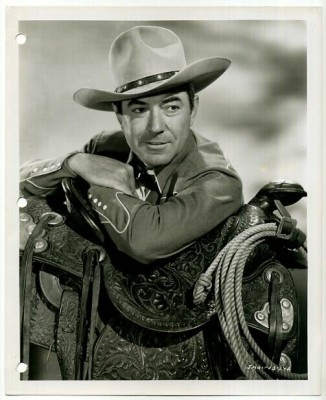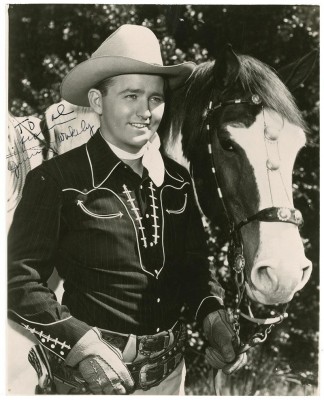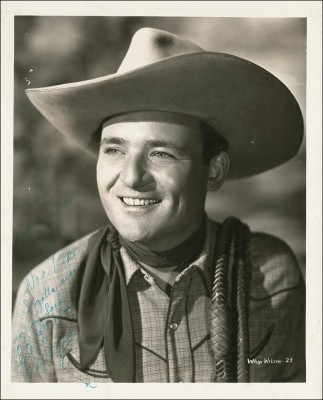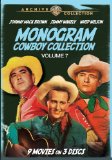| Reviews & Columns |
|
Reviews DVD TV on DVD Blu-ray 4K UHD International DVDs In Theaters Reviews by Studio Video Games Features Collector Series DVDs Easter Egg Database Interviews DVD Talk Radio Feature Articles Columns Anime Talk DVD Savant Horror DVDs The M.O.D. Squad Art House HD Talk Silent DVD
|
DVD Talk Forum |
|
|
| Resources |
|
DVD Price Search Customer Service #'s RCE Info Links |
|
Columns
|
|
|
Monogram Cowboy Collection: Volume 7 (nine movies)
Republic Pictures dominated the B-Western, with movies starring Gene Autry, John Wayne, and later Roy Rogers, among others. There were also the Hopalong Cassidy films, first released by Paramount and then later by United Artists. Universal, RKO, and Columbia also made lots of B-Westerns of varying quality, but some like the Tim Holt series for RKO were well above average.
Monogram, conversely, was second-rate even by B-Western's normally unambitious standards. Their Bs were superior to Poverty Row competitor Producers Releasing Corporation (PRC), but definitely lower on the B-Western ladder than Republic. The Jimmy Wakely series, for instance, were singing cowboy movies imitative of the better-produced films of Gene and Roy, while those starring Whip Wilson were patterned after Buck Jones's Bs while at the same time copying elements from PRC's Lash LaRue series.
Monogram's B-Westerns were, along with Columbia's, among the last classically second-feature Westerns made just before the whole kit and caboodle segued into early television. Movies like these - Volume 7 includes Brown's Trigger Fingers (1946), Whistling Hills (1951), Man from the Black Hills (1952), Wakely's Saddle Serenade (1945), Across the Rio Grande (1949), and Wilson's Gunslingers, Silver Raiders, Arizona Territory (all 1950), and Lawless Cowboys (1951) - were often shown on television during the 1950s-'70s but these 16mm TV prints were quickly run to death and soon looked like dog meat. Later on, these same worn prints would sometimes turn up on public domain home video releases looking even worse for the wear.
Warner Archive's Monogram titles tend to look less than pristine, but they're still vastly superior to what B-Western fans have had to put up with for years.
L-R: Johnny Mack Brown, Jimmy Wakely, Whip Wilson
Johnny Mack Brown, like John Wayne, came to movies by way of university football, appeared in minor roles in a handful of late silent films, then made an auspicious starring debut in a big-budget Western filmed in an experimental wide screen format. In Wayne's case the movie was Raoul Walsh's The Big Trail, while that same year Brown starred as Billy the Kid, directed by King Vidor. And, like Wayne, Brown quickly slipped down the ranks from A-budget studio films to B-budget Westerns. Unlike Wayne, who regained his footing with Stagecoach (1939) and Red River (1948), Brown pretty much stayed put in B-Westerns for the rest of his career, though he remained a popular star in that capacity.
The three Browns in this set are highly predictable but offset somewhat by Brown's laid-back, genial personality. Monogram's series fashions Brown (playing himself) as a standard Western hero. In Whistling Hills, for instance, worried townsfolk offer Brown a huge reward and 20% of any stolen gold he might recover from nefarious bandits but, after briefly mulling over the offer, agrees to the job simply out of the goodness of his heart. B-Western heroes were like that. And, true to B-Western stereotype, Brown shows more affection toward his trusty palomino, Rebel, than most of his leading ladies.
By Monogram's low-budget standards, they seem to have put slightly more care into Brown's series. The first film in the set for instance, Trigger Fingers was directed by Lambert Hillyer, a better-than-average second features helmer, and the latter two have interesting casts: Jimmy Ellison, Noel Neill, Rand Brooks, Denver Pyle.
Jimmy Wakely was Monogram's answer to Gene Autry, and the plots are again old chestnuts, tired stock stories seen in hundreds of other B-Westerns: stolen land grants, a respected marshal whose secret past is used against him, ex-Texas Rangers vs. corrupt Texas State Police, etc. Wakely made four to nine of these movies every year during the second half of the 1940s.
However, the music, not impacted by budgetary constraints, is first-rate, as good as the kind of thing one might find in top-tier A-Westerns. The music consists of new material (often written by Wakely) and old standards by Jimmie Rodgers. Wakely, to his credit, also seems to have been quite a generous performer. In nearly all of his films each of his supporting musicians is accorded a solo to show off his or her particular talent.
Whip Wilson (born Roland Meyers) debuted supporting a Jimmy Wakely Western, Silver Trails, before getting a big publicity push from Monogram, which lied outrageously about Wilson's background, claiming, "He was born on a fabulous ranch in Pecos, Texas, was a rodeo champion, has a engineering degree, is a direct descendant of General Custer, and he was a World War II Marine hero, and he does his own movie stunts," absolutely none of which was true. Wilson was stocky but generically handsome in a ‘40s kind of way, and Whip's whip became his studio-imposed trademark, though unlike Lash's lash he barely uses it, and in some pictures not at all.
Of the films in this set the Whip Wilsons were the ones I was least looking forward to, yet was pleasantly surprised to find at least a couple of the four here marginally better than the usual B-Western. In three of the four films Whip's sidekick is played by Scottish comedian Andy Clyde, who'd recently left the Hopalong Cassidy series and was then concurrently starring in a long-running series of two-reel comedies for Columbia. (Other than the Three Stooges, Clyde was Columbia's biggest and longest-lasting star of their comedy shorts, the series finally ending about the same time as the Stooges, in 1956.) In the last film of the set, Lawless Cowboys, Clyde was replaced, less effectively, by Fuzzy Knight.
Video & Audio
As a rule, the nine features in this three-disc set consist of good transfers of weaker film elements. Compared to MGM and Warner Bros. movies released under the Warner Archive label, the Monogram movies tend to be softer, muddier, and darker, though the official releases are still light years ahead of what these same movies looked like under various public domain labels. All nine are certainly acceptable even on big screen TVs, and fans of this kind of film should be pleased. The Dolby Digital mono audio (English only, no subtitles) is acceptable and the discs are region-free. No Extra Features.
Parting Thoughts
An acquired taste to be sure, but the movies are still quite enjoyable on several levels, and I'm delighted to see them get the respectful treatment they deserve. Recommended.
Stuart Galbraith IV is the Kyoto-based film historian and publisher-editor of World Cinema Paradise. His credits include film history books, DVD and Blu-ray audio commentaries and special features.
|
| Popular Reviews |
| Sponsored Links |
|
|
| Sponsored Links |
|
|
| Release List | Reviews | Shop | Newsletter | Forum | DVD Giveaways | Blu-Ray | Advertise |
|
Copyright 2024 DVDTalk.com All Rights Reserved. Legal Info, Privacy Policy, Terms of Use,
Manage Preferences,
Your Privacy Choices | |||||||

















